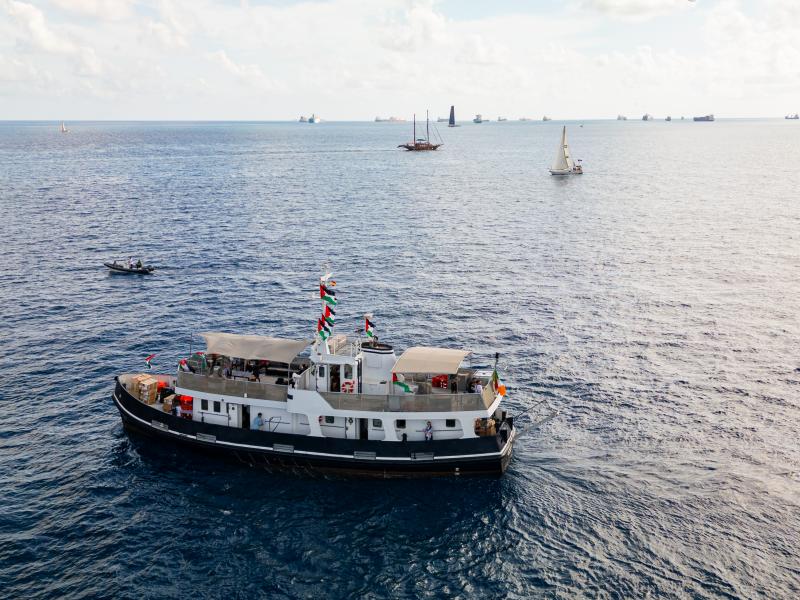The Productivity Commission has recommended deregulation of coastal shipping in a report into Australia’s agricultural exports, saying that to improve the efficiency of coastal shipping services, barriers to entry for foreign vessels should be removed to allow greater competition.
ITF president and Maritime Union of Australia (MUA) national secretary Paddy Crumlin said that not for the first time, the Productivity Commission had entirely missed the point of cabotage.
Speaking from a meeting of the ITF Cabotage Task Force in Oslo, its chair and president of the Seafarers' International Union of Canada, James Given, stated: "The ITF supports the MUA and strongly rejects any suggestion that coastal shipping laws should be wound back, when in fact they should be strengthened to ensure better national security, fuel security and protection of Australia’s pristine coastline.”
“Australia has the fourth largest shipping task in the world and the continuation of a domestic fleet logically should be of national and strategic interest. Rather than allow unscrupulous tax dodgers running flag of convenience ships and exploiting foreign labour in a race to the bottom, any sensible person can see Australia needs Australian crews under Australian pay and conditions working on the Australian coast." said Dave Heindel, chair of the ITF Seafarers' Section and secretary-treasurer of the Seafarers' International Union of the USA.
The conservative Australian Government recently released a Discussion Paper on Coastal Shipping, which is an improvement on the deregulation agenda of the previous Minister.
"The MUA remains disappointed that the discussion paper omits most of the proposals put forward in the industry Green Paper which was developed through exhaustive meetings over a long period of time with key stakeholders,” Paddy Crumlin said.
Among the proposed changes in the discussion paper is the removal of the five-voyage minimum requirement for a Temporary Licence (TL), which would allow for organisations to apply for single voyages instead of the current five.
There are also proposals to streamline the licensing processes for TLs and in instances where no General Licence (GL) vessels are available.
The proposed changes would make it easier for the Minister’s Delegate to provide Temporary Licenses (TLs) to foreign ships and make it more difficult for Australian ships with Australian crew to compete in the coastal trade.
The Paper also did not address any of the proposals which complemented the Green Paper, such as providing a new commercial solution to get the balance right between supporting a core Australian fleet supplemented by foreign ships on a Temporary Licence.
“The discussion paper fails the test of developing a long-term policy for manufacturing, fuel and energy security, and other core Australian industries largely in decline or abandoned to which Australian shipping is an essential service provider,” Mr Crumlin added.
The ITF urges the Australian Government to work with the MUA and develop a new and separate ‘maritime crew visa’ for non-nationals employed on ships issued with a Temporary License under the CT Act that includes the same labour market testing and worker entitlement provisions that apply to a 457-work visa.
ITF Cabotage Taskforce rejects Australia deregulation push
أخبار
بيان صحفي
على أرض الواقع
أخبار
بيان صحفي
الـITF وجمهورية الدومينيكان يتعاونان لتحسين ظروف العمل
يعمل الاتحاد الدولي لعمال النقل (ITF) على إقامة شراكة جديدة مع جمهورية الدومينيكان من خلال توقيع مذكرة تفاهم مع وزارة العمل بغرض تعزيز حماية الحقوق العمالية، وترسيخ الحوار الاجتماعي، وتحسين ظروف العمل
أخبار
بيان صحفي
بيان تضامن الاتحاد الدولي لعمال النقل مع أسطول الصمود العالمي
الاتحاد الدولي لعمال النقل ( ITF )، الذي يمثل أكثر من 16.5 مليون عامل نقل في 150 دولة، يؤكد تضامنه الثابت مع أسطول الصمود العالمي وكل من يبحرون بالهدف الإنساني البحت المتمثل في إيصال المساعدات المنقذة
أخبار
استعراض اجتماع المائدة المستديرة حول قطاع النقل في قطر
عقد الاتحاد الدولي لعمال النقل ( ITF ) ووزارة العمل في دولة قطر اجتماع مائدة مستديرة بمشاركة منظمة العمل الدولية و شركات النقل والخدمات اللوجستية المحلية والدولية لبحث سبل تطبيق قوانين العمل المحلية



